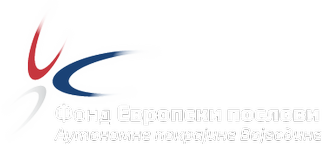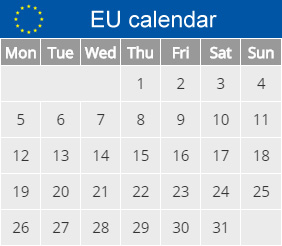1. European Parliament (eng.European Parliament)
The European Parliament is the representative body of the EU, which together with the Council of the EU is one of the main legislative bodies in the European Union. Representatives of the European Parliament are elected by direct voting, and the number of deputies from each country is proportional to the total number of inhabitants of that country in the EU.
Each country must have at least 6 representatives, and a maximum of 96, while the total number of deputies must not exceed 705 (704 plus the president). Deputies are grouped according to political orientation, not according to nationality.
Basic 3 roles of the European Parliament:
- Legislation in the European Union, together with the Council of the EU;
- Supervision of the work of other EU institutions, especially the European Commission;
- Adoption of the EU budget, together with the Council of the EU.
Headquarters: Brussels, Strasbourg, Luxembourg
More information at:
http://www.europarl.europa.eu
2. European Council (eng. European Council)
The European Council determines the general political goals of the EU, adopts guidelines for development, harmonizes the interests and positions of the states (key issues of interest for the EU’s foreign, security and internal policy). The European Council is a body of the EU, that is, a meeting of representatives of member states (the so-called EU Summit). The European Council meets twice a year, and if necessary, it can meet a maximum of two more times.
Although it is very influential in determining the political guidelines of the Union, the European Council does not pass laws.
Headquarters: Brussels
More information at:
https://www. consilium.europa.eu/en/european-council/
3. Council of the EU or Council of Ministers of the EU (Council of the European Union)
The Council of the European Union or the EU Council of Ministers is an EU body that together with the European Parliament has legislative power. It is made up of one minister from each member state, depending on the area on the agenda of the EU Council (foreign affairs, internal affairs, finance, telecommunications, education, etc.).
Basic tasks of the Council of the European Union:
- Implement legislative activities together with the European Parliament;
- Coordinates the economic policy of member countries;
- Concludes international agreements with one or more countries or international organizations on behalf of the European Union;
- Approves and manages the EU budget;
- Develops common foreign and security policy;
- Coordinates the activities of member countries and adopts standards in police and judicial cooperation in criminal matters.
An important role is played by the Committee of Permanent Representatives (KOREPER), which consists of permanent representatives of member states and their deputies. KOREPER prepares the agenda and decisions of the EU Council. KOREPER is divided into two levels:
- KOREPER l: technical and administrative issues. It consists of deputies of permanent representatives.
- KOREPER ll: gathers permanent representatives, i.e. ambassador and deals with political issues, which makes it a very influential body in the work of the Council.
Headquarters: Brussels
More information at:
http://www.consilium.europa.eu/
4. European Commission (eng.European Commission)
The European Commission is the most important executive institution of the EU. The Commission has the right to propose draft regulations and present them to the European Parliament and the Council of the EU, prepare decisions of the Council of the EU and implement them upon adoption, supervise the implementation of decisions and other regulations on the territory of the EU member states. It also ensures the implementation of founding agreements and realization of EU interests.
The commission has 27 members, one citizen of each member state, who are independent in their work.
The European Commission is divided into several departments and services, which include: traffic; energy; competition; agriculture and rural development; information society; internal market; tax policy and customs union; research and innovation; economic and monetary issues; humanitarian aid; enlargement and European neighborhood policy; international cooperation and development; trade; health and consumer protection; regional policy; education and culture; budget; Justice; internal affairs; employment and social issues.
Headquarters: Luxembourg (The Commission has representations in every EU country and around the world)
Europe 2020 Strategy is a document of the European Commission, which determines the direction of European developmentof the Union by the end of 2020.
More information at:
http://ec.europa.eu/
5. Court of Justice of the EU (Court of Justice of the European Union)
The Court of Justice of the EU ensures respect for rights during the application and interpretation of Treaties and acts adopted by other EU institutions, and acts in disputes between member states, EU institutions and individuals. The Court of Justice consists of 27 judges and 9 general advocates, who assist the judges in their work. One judge comes from each member state.
The composition of the Court of Justice of the EU consists of:
- General court: deals with disputes between individuals/companies and EU institutions/member states.
- Official court: deals with disputes between institutions/its officials.
Headquarters: Luxembourg
More information at:
http://curia.europa.eu/jcms/jcms /j_6/
6. Central European Bank (eng. European Central Bank)
The European Central Bank is an independent body that determines and implements the monetary policy of the eurozone, takes care of the stability of the single currency and the security and stability of prices for the citizens of the member states of the eurozone, manages international exchange operations and enables the operation of payment systems.
Headquarters: Frankfurt
More information at:
http://www.ecb.europa.eu/
7. Accounting Court (eng. European Court of Auditors)
The European Court of Auditors takes care of the legal and consistent management of the EU budget. It is composed of 27 members, one member from each member state, appointed by the Council of the EU in consultation with the European Parliament.
Headquarters: Luxembourg
More information at:
http://www.eca.europa.eu/ Pages/Splash.aspx
8. European Economic and Social Committee (eng.European Economic and Social Committee)
The European Economic and Social Committee is an advisory body that represents the views and interests of civil society in the European Commission, the Council of the EU and the European Parliament on issues of economic and social policy. The European Economic and Social Committee issues opinions on issues within its scope of work.
Headquarters: Brussels
More information at:
http://www.eesc.europa .eu/?i=portal.en.home
9. Committee of the EU Regions (eng.European Committee of the Regions)
The Committee of the Regions deals with issues of regional and local identity within the EU. It is composed of representatives of regional and local authorities. The European Commission, the Council of the EU and the European Parliament consult the Committee of the Regions regarding acts related to local and regional issues (employment policy, environment, education, health, etc.)
Headquarters: Brussels
More information at:
https://cor.europa.eu/en
10. European Investment Bank (eng. European Investment Bank)
The European Investment Bank is a financial institution of the European Union owned by 27 member states. This bank provides loans at favorable interest rates and finances investment projects that contribute to the balanced development of the Union, the business of small and medium-sized enterprises, technological development in the fields of research, innovation, environmental protection and energy in the EU and in neighboring countries.
Headquarters: Luxembourg
More information at:
http://www.eib.europa.eu/index.htm?lang=en&
11. European Investment Fund (eng. European Investment Fund)
The European Investment Fund helps small and medium-sized enterprises by giving them access to finance. The European investment fund does not invest directly in companies, but operates through cooperation with banks and financial intermediaries. It is active in all member states, candidates, potential candidates and signatories of the EFTA Agreement (Iceland, Liechtenstein, Norway and Switzerland).
Headquarters: Luxembourg
More information at:
http://www.eif.org/
12. European Ombudsman (eng. European Ombudsman)
The European Ombudsman is appointed by the European Parliament for a period of five years. It examines complaints from EU citizens, businesses and organizations. All individuals or entities living in the Union can complain to the European ombudsman if they feel that their rights are threatened by an EU institution or one of its bodies.
Headquarters: Strasbourg
More information at:
http://www.ombudsman.europa. eu/home/en/default.htm
13. European Data Protection Supervisor (eng. European Data Protection Supervisor)
This institution was created in 2001. The European Data Protection Supervisor takes care of the protection and privacy of natural persons’ data when the EU or its institutions process the personal data of EU residents.
Headquarters: Brussels
More information at:
https://secure.edps. europa.eu/EDPSWEB/edps/lang/en/EDPS













